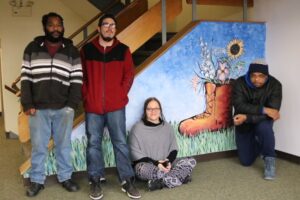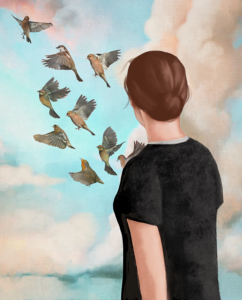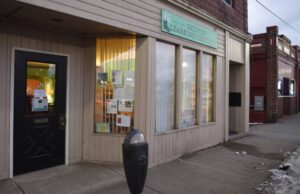
by LaMara HunterKelly | Mar 23, 2020 | In The News

Connection, whether one-on-one or in groups, is at the heart of peer support. In a time when social distancing, shelter-in-place, and stay-at-home orders proliferate, the Western Massachusetts Recovery Learning Community/Wildflower Alliance (WMRLC) is finding creative ways to adapt to rapidly changing circumstances dictated by the novel coronavirus…
[CONTINUE READING]

by LaMara HunterKelly | Jan 7, 2019 | In The News
 “To realize that somebody else has known that dark place is the only thing that made me feel less alone.”
“To realize that somebody else has known that dark place is the only thing that made me feel less alone.”O-Oprah Magazine – Dec 10, 2018
The only people who really understand what it feels like to want to end their lives are those who have been there.
That’s the basis of survivor peer-support groups, in which people who have experience with suicide come together to talk.
“To realize that somebody else has known that dark place is the only thing that made me feel less alone,” says Devon Shearer, a former group facilitator at the Didi Hirsch Survivors of Suicide Attempt Support Group in Los Angeles.
Talking about the tough stuff may be exactly what suicide survivors need.
“The group is where people can share things they can’t bring up with other folks in their lives,” says Caroline Mazel-Carlton, director of training for the Western Massachusetts Recovery Learning Community and a peer facilitator for Alternatives to Suicide groups. (Continue Reading…)
NOTE from the RLC:
“On December 11th, O Magazine (the Oprah magazine) published an article called “How Talking About Suicide Can Give People Something to Live for”.
The article focuses primarily on peer-to-peer supports and groups run by and for individuals who have considered or attempted suicide. We are proud to share that the Western Mass RLC’s Director of Training, Caroline Mazel-Carlton, was interviewed for and included in the article. This is based on the fact that the RLC is responsible for creating one of the first ever models for peer-to-peer support groups related to suicide, called ‘Alternatives to Suicide’. These groups have been offered by the Western Mass RLC since 2008. The RLC has also developed an adapted ‘Alternatives to Suicide’ approach for clinicians, family, and others, as well.
Unfortunately, the article takes some of what Caroline has to say out of context, indicating that perhaps people in the group don’t actually go as deep as to talk about killing themselves. However, in reality, what Caroline was saying is that—when given the space to talk about what is truly driving people to consider leaving this planet– there are often many other things underlying that drive that they want and need to talk about, and the groups serve as a space in which they can do that.
In spite of any thing the article got wrong, it seems important that more and more mainstream media outlets are recognizing the importance of peer support in supporting people through some of their darkest times!”

by LaMara HunterKelly | Jun 22, 2018 | In The News
 Western Mass Recovery Learning Community on Chapman Street in Greenfield. December 20, 2017
Western Mass Recovery Learning Community on Chapman Street in Greenfield. December 20, 2017By JOSHUA SOLOMON
Recorder Staff
Tuesday, June 19, 2018
GREENFIELD — The days of getting mixed up with its neighbors on Federal Street are now past them and instead the Recovery Learning Community at 20 Chapman St. is now finally feeling at home.
To celebrate its new center, the RLC is hosting an open house and open mic Wednesday.
From 1:30 to 3:30 p.m. members of the community are welcomed in for an open house, where there will be some homemade snacks offered, and then from 5:30 to 7:30 p.m. there will be an open mic.
“We’ve had a strong revitalization of the community since (opening its doors in October) at this new space,” Natan Cohen, a peer and employee of the RLC, said.
[Continue reading…]

by LaMara HunterKelly | Dec 20, 2017 | In The News
 Western Mass Recovery Learning Community on Chapman Street in Greenfield.
Western Mass Recovery Learning Community on Chapman Street in Greenfield.Photo by Recorder Staff/Paul Franz
By JOSHUA SOLOMON
Recorder Staff
Wednesday, December 20, 2017
GREENFIELD — The old space was embattled. The old space flooded. The old space had mold issues. The old space was too narrow. The old space was somewhat removed from Main Street. And, the old space was constantly confused with its neighboring space next door on Federal Street.
The Western Mass Recovery Learning Community of Greenfield is not The RECOVER Project (although they sometimes partner together and share spaces), and now it is clearer than ever which one is which.
After a 13 month search process, the Western Mass Recovery Learning Center (RLC), which works to support healing and growth for individual with advocacy and peer-to-peer support, has moved into a space on Chapman Street, ending a bit of a nomadic existence…
[Continue Reading]

by LaMara HunterKelly | Aug 16, 2016 | In The News

BOSTON GLOBE -AUGUST 12, 2016
OPINION | By Sera Davidow
THE AVERAGE citizen has now heard (multiple times) the story of people with psychiatric diagnoses who are slipping through the state’s cracks, how their families are desperate but lack resources, and how the mental health system is failing us all. Yet there are two related stories that are hardly getting told: one good, and the other very, very bad.
Let’s start with the latter. While so many people argue for increased access to treatment, few stop to examine those elements of which it is composed. Here’s just a handful of the many points getting missed:
• Patients of the mental health system are dying, on average, 25 years younger than the rest of us, according to the National Association of State Mental Health Program Directors.
• The highest suicide risk directly follows forced hospitalization.
• Unlike with diseases such as diabetes, outcomes for psychiatric diagnoses have not improved.
• Long-term use of psychiatric drugs appears to beckon worse outcomes for many, and even short-term use potentially increases the risk of violence.
(continue reading…)






